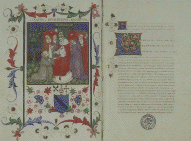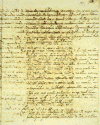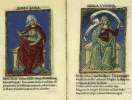
One of the issues on which some humanist intellectuals parted ways with traditional scholasticism was the nature of theology. Most scholastics believed that theology was a science, to be learned and taught by qualified professionals trained in logic and familiar with the recognized authorities. A vocal minority of humanists, such as Lorenzo Valla and Erasmus, challenged this claim, arguing that "the philosophy of Christ," i.e. the message of Christianity, could be learned by any educated person who studied the Bible with piety. These humanists claimed that their philological style of Biblical exegesis was modelled on the practice of the ancient Christian Fathers, whose authority should be preferred to that of modern scholastic doctors. The humanists of course found many opponents among contemporary scholastics, one of whom, Antonio da Rho, was the author of the volume displayed here. In it, Antonio tries to discredit the automatic humanist equation of earlier with better by showing that one of the early Christian writers, Lactantius (ca. 240 - ca. 340), had made numerous theological errors to which later scholastic writers had not been subject. This dedication copy for Pope Eugene IV has a colorful decorative border with a miniature showing the Franciscan friar presenting his work to the pope.
Vat. lat. 227 fols. 4 verso-5 recto human03 JH.01

In addition to the revival of ancient literature, the humanist movement also encouraged a revival of ancient philosophy. The medieval universities had been dominated philosophically by Aristotle, but the humanists insisted on the importance of other ancient philosophers as well--the Stoics, the Epicureans, the Skeptics, and most of all, the Platonists. The revival of Christian Platonism was the most important philosophical and theological movement of the later fifteenth century. Its chief protagonist was Marsilio Ficino, a Florentine humanist who had a number of patrons and followers in Rome. The volume on display is a presentation copy of Ficino's letters (really letter-treatises on Platonic themes) to one of Ficino's Roman patrons, Cardinal Francesco della Rovere. The portrait medallion by Francesco Rosselli depicts Cosimo de'Medici, Ficino's most important early patron. An exchange of letters between Cosimo de'Medici and Ficino opens Book I.
Vat. lat. 1789 fol. 5 verso-7 recto (sic, no fol. 6) human04 JH.04

No documents better show the sharp shift in attitudes between the High and the Late Renaissance Church than these reviewing the publications of Cardinal Pietro Bembo (1470-1547), who died a quarter century before the founding of the Congregation of the Index. Bembo had been one of the great literary dictators of Europe whose Neoplatonic allegories had been the height of fashion and whose love-letters to great ladies such as Lucrezia Borgia had excited no adverse comment. After the Council of Trent, however, his works began to seem a bit frivolous, even dangerous, at least to the humorless bureaucrats of the Congregation. The witness whose testimony is summarized here, for instance, charges the late cardinal's Neoplatonic love poetry with "mixing holy things with profane, and using false opinions contrary to the faith while at a masque."
Vat. lat. 6207 fols. 60 verso-61 recto human05 JH.11

In its efforts to fight the spread of Protestant heresies, the church was, in the end, forced to impose a degree of censorship that had a chilling effect on certain activities of humanists, especially the writing of history and philosophy. Like other European princes, the popes made spasmodic efforts to suppress dangerous books in the early sixteenth century. After the Council of Trent, however, these efforts became more systematic. Heretical books were placed on an "Index of Prohibited Books;" their readers and publishers were automatically excommunicated; and a system of ecclesiastical censorship was established under the control of the local diocese and the Congregation for the Index (founded 1571) in Rome. The documents on display come from the office of the Congregation for the Index, and consist of testimony regarding the orthodoxy of a publication by the famous "liberal" Catholic historian Carlo Sigonio, attacked here for "imitating Lorenzo Valla" in his view on the Donation of Constantine--a document, forged in the eighth century, purporting to record a grant, by the fourth-century Emperor Constantine, of supreme power over the Empire to the See of Saint Peter. Lorenzo Valla, the great humanist scholar, had exposed the document as a forgery in the fifteenth century. Sigonio like most competent scholars of the sixteenth century accepted Valla's judgment, but was forced by the Congregation to suppress his real views in the published version of his book.
Barb. lat. 1038 fol. 182 recto human06 JH.13

Traditional interpretations of the Bible were challenged on two fronts in the sixteenth century. On one side, Protestants like Luther and Calvin claimed that the original "evangelical" interpretation of the Bible had been lost owing to medieval corruptions and that only the Protestants understood the real, ancient meaning of the Bible. On the other, humanist scholars like Erasmus challenged traditional interpretations, showing that they rested on corrupt texts or anachronistic assumptions about the meaning of the texts. In the heat of Counter-Reformation controversy, these two kinds of criticism were often confounded. One party in the church which, while rejecting Protestantism, was concerned with purifying traditional usages and understandings in accordance with the best scholarship, was the so-called "Erasmian" wing, which fell into disrepute after the Council of Trent. Sigonio, who had many connections with Erasmian Catholics, also suffered from this reaction. The witness whose testimony is recorded in the documents on display charges Sigonio with "insinuating the error of Erasmus, who asserted there could be errors in the books of Holy Scripture owing to the human condition of copyists." (fol. 69 recto)
Boncompagni F 9 fols. 69 verso-70 recto human07 JH.14

One of the fashionable historical myths of High Renaissance Rome was the legend that has come to be known as "ancient theology." Misinterpreting certain late antique sources such as the Hermetic Corpus, Lactantius, and Eusebius, Renaissance Platonists came to believe that Christianity was merely the latest and best form of divine revelation to the human race. They argued that pagan religious traditions had also been based on revelations to great religious thinkers such as Plato and Hermes Trismegistus, and that high paganism conveyed divine truths identical to those of Christianity, though more obscurely. The female prophets of the pagans--the sibyls--came to be seen as parallel to the Hebrew prophets of the Old Testament--an interpretation underlying Michelangelo's depiction of prophets and sibyls on the ceiling of the Sistine Chapel. In the work on display, printed thirty years before Michelangelo, a Platonizing Dominican theologian appealed to the authority of the pagan sibyls to interpret doctrinal differences between Jerome and Augustine, much as a medieval scholastic might have cited an Old Testament prophet to cast light on the New Testament or on the writings of later Christian authorities. The two sibyls depicted here are the Samian and Cumaean sibyls; the latter predicted the virgin birth of Christ, according to a famous old interpretation of Virgil's "Fourth Eclogue."
Stamp. Membr. IV 29 fols. 9 verso-10 recto human08 JH.28